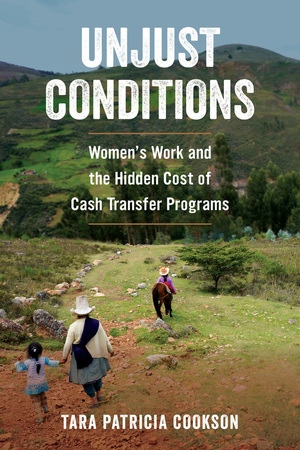Unjust Conditions: Women’s Work and the Hidden Cost of Cash Transfer Programs
by Tara Patricia Cookson, University of California Press, 2018
Reviewed by Jasmine Gideon

In Unjust Conditions: Women’sWork and the Hidden Cost of Cash Transfer Programs Tara Patricia Cookson provides an excellent ethnographic study of the implementation of the conditional cash transfer (CCT) programme, commonly known as ‘Juntos’ (Together), in Peru. CCT programmes have been widely promoted in Latin America and beyond as a means of reducing poverty, particularly in female- headed households. Programme recipients typically receive small but regular cash payments on condition they comply with a list of conditions that are primarily aimed at improving the health and well-being of children in the household. These conditions often include ensuring young children undergo regular health checks and are vaccinated against commonly occurring infectious diseases as well as attending school regularly; at times women are also expected to attend ‘parenting’ classes. CCTs have been widely critiqued by feminist scholars, particularly because of the ways in which such programmes rely on women’s maternal role, and frequently reinforce gender inequalities. As Tara Cookson’s analysis at the start of the book shows, the design and methods of evaluating Juntos do little to challenge these feminist critiques. Yet it is in the subsequent chapters that the strength of the book really emerges, as Tara Cookson argues it is not just the maternalist scope of the programme that is problematic, but that women are frequently required to fulfil an additional range of ‘informal’ or what she terms ‘shadow conditionalities’. As Tara Cookson explains, ‘I use the term shadow to evoke the idea that the activities were not present in the tangible spaces of policy. They were not featured on the Juntos website or in the manuals used to train local managers … ’ (pp. 128–30). Yet, Juntos’ clients knew that if they did not complete these tasks, they faced the possibility of having their payments stopped by local managers for non-compliance with the programme’s conditions. Given that the majority of poor women in Peru are also more likely to be indigenous women, this also points to the importance of the intersection of gender and race in explaining which women bear the brunt of the shadow conditionalities of Juntos.
One of the real strengths of this book is the evocative presentation of the ethnographic research that Tara Cookson conducted among the rural Andean communities where many of the female recipients of Juntos live. Throughout the book, she consistently shows how CCT programmes, which are framed as a means of helping women and their households move out of poverty, in fact create new forms of unpaid work and demands on the time of poor, racialised women. At one point, women recipients of Juntos provide Cookson with a list of tasks they are expected to complete before being allowed to receive their CCT payment. These include attending meetings, growing a garden, giving birth in a health clinic, keeping hygiene instruments (toothbrush, soap) organised, cooking for the school lunch programme, participating in political parades, and painting a Juntos flag on the outside of their house (p. 128). On average, each woman had to conduct around four of these additional tasks or ‘shadow conditionalities’.
In another chapter, Tara Cookson highlights the gendered inefficiencies of the programme, e.g. in Chapter 4 she describes the process of collecting the cash payments from the state. For some women, this means leaving their rural communities at 3 am, walking for up to four hours carrying young children on their backs, waiting for several hours outside, exposed to the elements and with no access to toilets or other facilities, before they can enter the government building where they will receive the payment. Once they have eventually received their payment (as long as they can show their ID), the women then have to make the arduous journey back home again. This was, of course, all time that could be spent on other activities such as subsistence farming, child care or even leisure time! Yet as Tara Cookson notes, the wasting of women’s time also ‘had the unintended consequence of putting women in their place’ (p. 95) as they wait for the state to grant them their entitlements.
Overall, this is an excellent book and a thoroughly researched piece of scholarship. The presentation of the material in the book suggests a level of sensitivity and in-depth engagement in the lives of those Tara Cookson is writing about. She is able to present her informants in a perceptive and nuanced way which shows careful reflection of wider debates around ‘development’ and representation. Another strength of Unjust Conditions is that Tara Cookson deliberately writes in a highly accessible way, in order to ensure that the knowledge presented in the book is available to a wide audience. This is a ‘must read’ for all those with an interest in the gendered and racialised nature of poverty, and the shortcomings of current poverty reduction policies.
© Jasmine Gideon 2019
